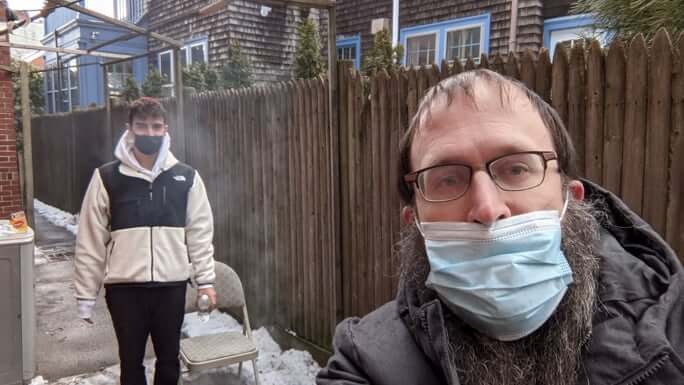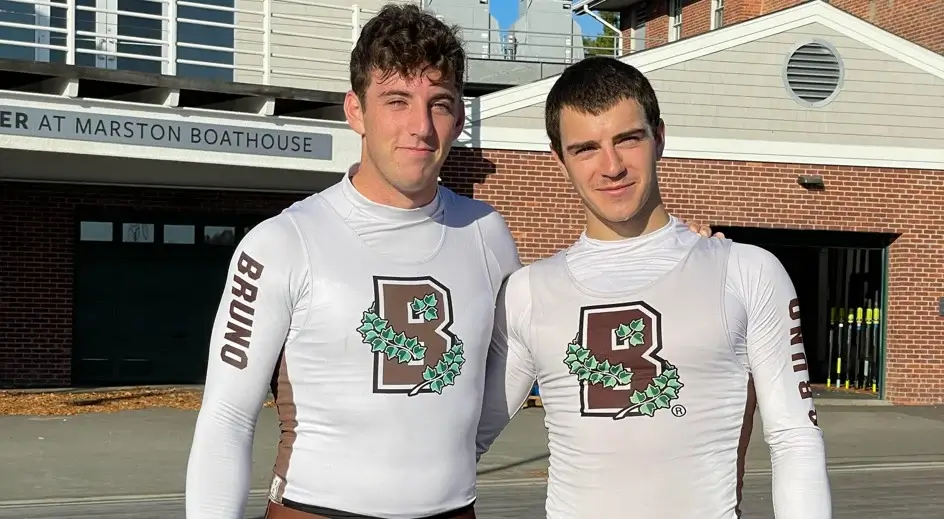The original article is published at chabad.org
Amid rising antisemitism on American college campuses, Swidler brothers unite in their faith
For Nathan and Asher Swidler, two brothers on the Brown University heavyweight rowing crew team, their strong and always evolving relationship with Chabad-Lubavitch began with the installation of a mezuzah on a cold day in Providence, R.I., in the middle of the pandemic.
Nathan (“Nate”), 23, and Asher (“Ash”), 22, are just 14 months apart in age and grew up in London to American parents. Having been raised with a strong sense of Jewish identity, upon completing high school, both boys spent a gap year in Israel.
Nate has been rowing since the age of 15, when he picked up the sport during his school days at Eton, a prestigious boarding school in England. When choosing which college to attend, he decided on Brown, as it is one of the top rowing teams in the country, while also being well known for its rigorous Ivy League education. Ash was a rare “walk on” to the crew team, which he joined during his junior year.
And Nate’s not just another rower. His memorable rowing moments include winning the Henley Royal Regatta in 2019, beating Harvard last year in the dual race and rowing in the pair competition with his brother.
Their family’s connection to Chabad goes back generations. The boys’ father, Josh, recalls his mother teaching in the Chabad yeshivah day school in Worcester, Mass., which was led for more than seven decades by Rabbi Hershel Fogelman. Though at the time the family identified as Reform, this connection eventually led them to keeping a kosher home.
Another link in the chain was added when the Swidler boys arrived on Brown’s campus in January 2021.
“We both knew we wanted mezuzahs on our doorpost,” Ash told Chabad.org.
Nate told a friend from London who was active in Chabad at Columbia University, who in turn reached out to Rabbi Mendel and Chana Laufer, co-directors of the Rohr Chabad House serving Brown University, Rhode Island School of Design (RISD) and Johnson & Wales University, all of them in Providence.

In 2021, the day after their mandatory “two-week quarantine” arrival period ended, the rabbi greeted the boys outside the dormitories with a warm smile and open arms. Credit: Chabad of College Hill
The First of Many Meetings
This was back in the Covid days, and the day after their mandatory “two-week quarantine” arrival period ended, the rabbi greeted the boys outside the dormitories with a warm smile and open arms—at the time, he was not allowed inside due to pandemic regulations—and handed them each a mezuzah, a homemade challah and cards with the Shema prayer.
The relationship between the two British expats and the Laufers grew as the weeks went on.
“Nate’s and my initial interaction with the rabbi swiftly led to weekly meetings,” Ash said. “We would sit outside in the freezing cold January winter for hours. For me, Rabbi Mendel’s conversations evoked an element of authenticity that I found to be lacking in conversations with hundreds of fellow students.”
Ash, who is the current student president of Chabad at Brown, proudly chronicles its growth since he started there.
“Today we have over a hundred students coming on a regular Friday night,” he said.
There is a kosher kitchen in the largest dining hall at Brown, and this year dozens of students affixed a mezuzah to their doorposts courtesy of Chabad.
Eventually, the boys committed to putting on tefillin regularly. Rabbi Laufer, sensing the opportunity for a meaningful birthday gift, reached out to Ash’s father, Josh, to organize Ash to receive his own pair for his 22nd birthday.
“Following the passing of my wife, Ash found significant meaning and comfort in Torah study, something I am both proud of and encouraged with my whole heart,” Josh Swidler explained. “If I can play even the smallest part in enhancing Jewish identity and meaning for my children, I will do it.”
Nate participates in weekly Sinai Scholars classes and has managed to attend Shabbat dinners nearly every week of his senior year. The Swidlers devotion to Chabad and Jewish life on campus is even more noteworthy considering the demands made on college athletes.

After resolving to put on tefillin regularly, Ash received a pair of his own from Rabbi Mendel Laufer for his 22nd birthday. Credit: Swidler family
Standing up for Israel at an Ivy League
In the wake of the Oct. 7 terrorist attacks and what they describe as the “worryingly hostile climate for Jews” across college campuses, the brothers knew they had to do something.
“We felt desperate to champion the cause in a way we knew how, to spread positivity both on and off the water,” said Nate. So they came up with an idea that would literally make the Jewish people’s connection to their ancient homeland “in fashion” on and around campus—and on the water.
Nate and Ash designed a unisuit with the Star of David on the front and “Am Yisrael Chai” written on the back. The outfit made it easy for fellow rowers and classmates to see their support for the Land of Israel and its people.
They assumed that the project would receive mixed support from the rowing team, so they polled each member individually to see if they would consider wearing the uni. “Thirty of fifty said they wanted one—it warmed our hearts!,” said Ash.
Brooke Verschleiser, a student at Brown, is proud of the Swidlers and their enthusiasm to wear their Jewish identity on their sleeves.
“Seeing Ash and Nate stand up for Israel in the midst of adversity on campus is truly inspiring,” she said. “Their fortitude in defending Israel … is a powerful example for other students to advocate for the truth and stand up for what they believe in.”
Ash credits a fair share of their initiative to Rabbi Laufer.
“Rabbi Laufer is the smartest guy I know,” he said. “He is a source of support and a builder, creating a home where even the university president feels comfortable and welcome.”
Ash and other students appreciate Brown President Christina Paxson’s support for Chabad, where she is a familiar face. Laufer notes that she was sharing Shabbat dinner at Chabad on the same day other Ivy League college presidents were testifying about antisemitism on campus in Washington, D.C.
Chabad at Brown likewise receives the highest compliments of Joshua Bolton, the executive director of Brown/RISD Hillel.
“There really is no example like Brown, where Hillel and Chabad are working as closely together on behalf of the Jewish future,” he said. “There’s a story I’ve heard about the Rebbe [Rabbi Menachem M. Schneerson, of righteous memory] hopping a fence. Mendel and Chani are the ultimate fence-hoppers. Nothing stands in their way. Nothing can prevent their holy work.”

The Swidlers devotion to Chabad and Jewish life on campus is even more noteworthy considering the demands made on college athletes. Credit: Chabad of College Hill



